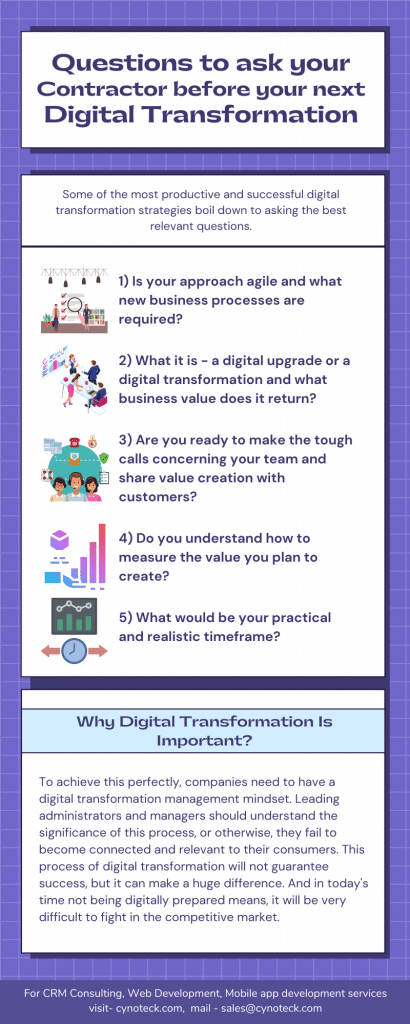Innovation is the main pillar of digital transformation in any business. The addition of new competencies rotates around the capabilities to be more flexible, people-oriented, customer-centric, smooth & innovative, efficient, and able to leverage opportunities to improve the existing state and drill into new increasingly unstructured data sources, big data, and service-driven revenues, including the Internet of Things as an essential facilitator.
Digital transformation leverages technologies to build value and innovative services for different stakeholders and gain the skills to quickly adapt to varying conditions across all levels and functions in a strategic way. Digital transformation seeks to utilize technology for accomplishing goals: more production, fewer errors, more reliable product quality, and enhanced customer service. So, companies need to be alert and observant toward the growing aspect of their business and be assured to count on the right talent to implement any new business models, as well as train and preserve the existing skill and talent.
However, you must be aware of the fact that vertical experience in digital transformation is also important, but it is not everything that only matters, it is more of a strange belief with several organizations that when choosing a consultant to assess technology that particular vertical experience to that product level is necessary. Well, this is not the case, instead what matters most is the transferable process understanding and business skills to make good judgments and take quick decisions. What is more important is the variation in vertical markets is which core functions they incorporate, not the functionality themselves.
Also, read: Do small businesses need an ERP system? 7 Signs it’s time to implement an ERP
Questions to ask your Contractor before your next Digital Transformation
Digital transformation is not just a subject of investment, but of building strategies, executing, and considering the challenges and possibilities associated with it. Some of the most productive and successful digital transformation strategies boil down to asking the best relevant questions.

1) Is your approach agile and what new business processes are required?
While implementing an IT strategy it is essential to ask questions that how intelligent your strategy is and how will it be able to adjust to business disruption and technology. Any digital transformation progress becomes successful by constant innovation – by effectively changing business models and abilities in steady steps over time, and as resources permit. This allows businesses to begin, learn, and re-launch digital initiatives, quickly responding to shifting market conditions and customer requirements.
In every project, there may be any number of unstated assumptions about new capabilities IT should deliver. These assumptions include integration, scalability, and a range of user needs. So, for large projects requiring process changes, you should not accept a rush of change demands right away.
2) What it is – a digital upgrade or a digital transformation and what business value does it return?
Several companies target digital transformation and end simply with digital upgrades, which is utilizing digital technology to improve efficiency or at something that your firm was already doing. But a digital transformation in actuality occurs when you utilize digital technology to transform the way you work, especially concerning customer interactions and the way that value is built.
There are times when businesses ask for changes that don’t add any value. To help simplify the benefit of requests, IT should work on developing context by getting knowledge of your products and services, knowing the competitive aspect, and staying up to date about the administrative environment.
Also, read: How to implement an app idea – 7 actionable steps to take
3) Are you ready to make the tough calls concerning your team and share value creation with customers?
Sometimes a new vision needs new people to build it. And there may be a chance that the digital people that you need on your team may not be present in your organization, or at least not in the right quantity. So, to make place for new digital transformation, you need to make some tough calls early on, concerning your board and team, as some of your current staff can create roadblocks and resistance for a required change.
Distributing the workload appears like a winning statement, but several leaders are reluctant to surrender control and do not rely on a network that extends outside their series of commands. So, working with those external groups needs new and co-creative leadership techniques, but it can also enable organizations to drill into under-utilized resources.
4) Do you understand how to measure the value you plan to create?
Most organizations focus is on physical capital – for making and selling assets, or human capital for delivering services. These firms track utilization, productivity, inventory, and other established Key Performance Indicators (KPIs). The end goal of digital transformations is to impact revenue, profitability, and investor value. But it is helpful to track intermediate indicators. For many digital network companies, this includes sentiment and engagement as well as network co-creation and value sharing. The action plan you develop to support your business strategy should list the metrics you will track, which can be broken into milestones and quantifiable performance measures.
Also, read: 5 Things most successful business Apps have in common
5) What would be your practical and realistic timeframe?
How to make a digital transformation project successful remains uncertain for many. And investigating the timescale of the digital transformation process is perfectly reasonable.
Therefore, while executing the digital transformation process it is important to remember the end goal, but it is equally important to establish milestones that your business associates want to achieve along the way. Building a timeline of the entire project, including incremental objectives, can help IT break projects into easy and manageable parts. This method helps you deliver the business processes and abilities that the business needs.
Why Digital Transformation Is Important?
Executing digital strategies successfully depends on the type of industry. Industries that are extremely driven by technological innovations need those businesses adapt at a very accelerated speed but picking the best digital transformation service can be difficult.
To achieve this perfectly, companies need to have a digital transformation management mindset. Leading administrators and managers should understand the significance of this process, or otherwise, they fail to become connected and relevant to their consumers. This process of digital transformation will not guarantee success, but it can make a huge difference. And in today’s time not being digitally prepared means, it will be very difficult to fight in the competitive market.
Why Choose Cynoteck – Take advantage of our vertical expertise in digital transformation
The business world today is undergoing all sorts of digital transformations. And a leading approach needs to have the best skill and expertise that you can discover including the right digital tools. Doing this can make your company ready to successfully plan and execute a digital transformation strategy that emphatically influences how you work and your business outcomes. The right software development partner with expertise in digital transformations can also help you in getting a fair understanding of how to achieve digital transformation objectives and implement the right digital technology to succeed.
So, whether you are a manufacturer, an educational foundation, or a healthcare provider, Cynoteck can assure you that your IT platforms and services are suitable for design and are future-proof. Our comprehensive technical expertise in digital transformation and the experience to provide a wide range of services along with our strategic partnerships will guarantee that you can accomplish your digital transformation goals.
Cynoteck works with leading companies throughout the world. We help you simplify your planning process and accelerate the deployment of your innovative solutions. To take the next step in your journey of digital transformation, contact Cynoteck today.
Also, read: How is AI in Marketing revolutionizing the Marketing Industry
Final Words
Digital transformation is a large project, particularly for bigger, established companies. When executed right, it can build a business that is more aligned with consumer demands and flexible throughout the fast-moving digital future. You should likewise attempt to establish a practical timeframe rather than the timeframe that the business speaks and work with a digital partner that has the experience and willingness to deliver what you require. Answers to these above-defined questions can provide closer collaboration and association with your business partners.

Offshore Development Services
If you want to lower your development cost and improve your software quality than start your Offshore Development Center at Cynoteck.


Such a great Article. Very helpful for begainers.